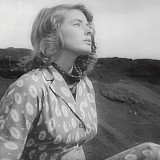
Known as the father of the Neorealist film movement with his emblematic masterpiece Rome Open City – Roma Citta’ Aperta (1945), Roberto Rossellini in 1950 decides to change direction. Seeing the role of cinema as mirroring a constantly evolving reality, he believes Italy has changed and there is no reason for producing more films about rough realities placed in bombarded cities. Italy in the early 1950’s is going through reconstruction that dramatically affects the fabric of society.
Hence, the rationale for moving away from Neorealism and towards what is known as the psychological human drama that focuses on the individual with themes of alienation, loneliness and more specifically of a woman who suffers. In other words, turning the ordinary story of the individual into the extraordinary. Stromboli is part of this human trilogy that includes Europa 51’ (1952) and Voyage in Italy – Viaggio in Italia (1955). The trilogy is also known as “Ingrid Trilogy” because of the participation of Ingrid Bergman in all three films, a fact that in those days created a huge controversy both in Italy and the United States. It all started when Bergman at the peak of her career wrote a letter to Rossellini:
Dear Mr. Rossellini, I saw your films Open City and Paisan, and enjoyed them very much. If you need a Swedish actress who speaks English very well, who has not forgotten her German, who is not very understandable in French, and who in Italian knows only “ti amo”, I am ready to come and make a film with you. Ingrid Bergman (source: Wikipedia)
Shortly after they started working together on Stromboli and becoming a couple, each leaving their spouse and kids. Rossellini at the time was having an affair with Anna Magnani – one of Italy’s leading actresses known for her passionate, down-to-earth roles. As a result Bergman was black listed for 7 years in Hollywood and Rossellini’s film was harshly criticized in Italy that saw this development as breaking a taboo. Interestingly, had this extramarital affair occured in the early 1960’s during the indulgent years of La Dolce Vita – reactions would have probably been milder. In this context, the film tells the story of Karin (Ingrid Bergman) that as a way to escape a prisoners’ camp marries a fisherman, Antonio (Mario Vitale) who takes her to his home on the island of Stromboli.
[youtube width=”615″ height=”461″]http://youtu.be/nAsxCpklYeQ[/youtube]
The island is part of the Aeolian islands and is portrayed as an island of hell battered by strong winds and frequent eruptions of a volcano that disrupts the lives of the villagers. Into this reality Karin is brought to live and quickly she finds herself unable to adjust. She sees herself much more sophisticated then the locals and pragmatic as she is, she soon tries to escape the island. The film follows Karin as she gradually sheds off her materialistic and opportunistic views of life facing the punishing forces of nature around her (hence the reason behind the title Stromboli – The land of God – Terra di Dio) – and the need to look for answers within herself instead of outside.

